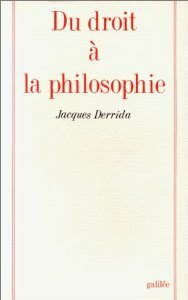The London Graduate School
Summer Academy in the Critical Humanities
June 22-25 2015
Right to Philosophy
Featuring Etienne Balibar, Andrew Benjamin, Howard Caygill, Rebecca Comay, Catherine Malabou, Martin McQuillan, Simon Morgan Wortham, Stella Sandford and Bernard Stiegler
The London Graduate School is pleased to announce its 2015 Summer Academy, an intensive week-long programme offered annually for postgraduate students of any institutional affiliation. This year the theme of the Summer Academy is Derrida’s Right to Philosophy. Once more the event will be held in central London, and the venue is University College London.
The ensemble of texts found in Du droit à la philosophie reflect Derrida’s engagement from the 1970s onwards with French political debates about the reform of national education and the future of philosophy teaching in the university in France and beyond. Here, he intervenes in the question of the institutional conditions and possibilities of philosophy as both an historical legacy and ongoing provocation to the future.In 1975 Derrida co-founded the Greph (Group de Recherches sur L’Enseignment Philosophique), a group committed both to theoretical investigation and activist intervention. Greph was founded in response to a perceived political and ideological attack on philosophical education on the part of the French government, operating under the general sponsorship of a matrix of economic, political, and techno-industrial and techno-military powers. While the election of Mitterand’s socialist government in 1981 hardly brought such concerns to a satisfactory conclusion, a state initiative was launched to establish an international college of philosophy in France, and Derrida took a leading role in the difficult process of negotiation and consultation that led to its inauguration in 1983, becoming the first director. At the time this call was being finalised, we learned of the threat of closure of the Collège international de philosophie (CIPH), which must surely provoke a renewal of the struggles that characterised its founding.
For Derrida, philosophy’s asymmetrical contract with the university—neither belonging nor not-belonging to the institution as a part of the whole, the universitas, which it itself allots—makes possible an opening on to the very question of the structure and effects of the university space, not least in its relations with the wider world (although Derrida is always most vigilant about the very fragile and deconstructible relationship between the supposed ‘inside’ and ‘outside’ of the institution). In other words, it is philosophy’s ‘with-against’ relation to the university that often interests Derrida in his interventions in political debates about French educational reform during this period. Derrida is less concerned with a straightforward defence of philosophy in its accepted scholarly guise than in transformative moves and gestures that make possible the ‘other’ of philosophy itself. Here, the question of the right to philosophy acquires a multiple sense. Whether one can ever proceed to the ‘philosophical’ directly as much as whether philosophy is a duty, privilege or justification (itself a question that is not always well served by excessive ‘directness’) is posed by Derrida as, among other things, a continued provocation to the question of the institution. If such questions about philosophy, the university and its ‘outside’ are just as urgent and pressing now as they were forty years ago, it is to the extent that they also make possible a certain powerful and productive resistance to discourses about what is ‘urgent’, dutifully or directly necessary, unanswerably pragmatic, and so forth—discourses that strongly facilitate dominant forms of governmentality and power today. The plight of the CIPH–still uncertain despite its apparent reprieve–is of course linked to a political discourse of pragmatism, so it is in this vein that our focus will very much be on the continuing relevance of Right to Philosophy as much as its historic context.
As always, registration for the Summer Academy is free, but by application and selection only. The number of places is limited. The London Graduate School will receive applications from 1 November 2014 onwards. The closing date is 20 February 2015.To apply, please send an expression of interest, current CV, and sample of recent work by email to Professor Martin McQuillan (m.mcquillan@kingston.ac.uk) and Professor Simon Morgan Wortham (s.morganwortham@kingston.ac.uk). Please make the subject heading of your email ‘LGS Summer Academy 2015’. Students are welcome to make their own arrangements for accommodation during the week, or alternatively we will be able to direct you to campus accommodation available at a subsidised rate. All tuition and course-attendance is wholly free of charge for all selected candidates.